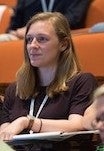 Amelia Urry’s deep curiosity took off at an early age, fueled by rocket scientists. Her father helped launch NASA satellites into space and her mother worked on the Hubble Telescope. “They were always encouraging me to ask questions about things that interested us, and science was always a part of that,” says Urry, an associate editor at Grist and an alumna of Metcalf Institute’s 2016 Annual Science Immersion Workshop for Journalists.
Amelia Urry’s deep curiosity took off at an early age, fueled by rocket scientists. Her father helped launch NASA satellites into space and her mother worked on the Hubble Telescope. “They were always encouraging me to ask questions about things that interested us, and science was always a part of that,” says Urry, an associate editor at Grist and an alumna of Metcalf Institute’s 2016 Annual Science Immersion Workshop for Journalists.
After graduating Cum Laude from Yale University with a B.A. in English, Urry, who had once considered a career in the sciences, set her sights on journalism. “I felt like doing environmental reporting was a real service,” said Urry. “I could still be curious and ask a lot of weird questions about how the world works, but I’d also get to do the storytelling that I love.”
Urry covers everything from ocean science, wildlife and climate change to clean energy and technology. A desire to dig deeper into environmental stories and gain a clearer understanding of the context and nuances behind those stories led her to apply for a Metcalf fellowship. “I really liked environmental reporting, but I didn’t feel like an expert by any means,” explained Urry.
“The workshop helped me see the bigger picture,” said Urry, who, in addition to developing new skills, also gained new sources including Rutgers University climate scientist and Metcalf Advisory Board member Jennifer Francis. “I needed an outside expert to give credence to a report I was covering,” said Urry, who spoke to Dr. Francis on background for at least two stories, including a story about new climate change projections by James Hansen, the scientist who first sounded the alarm about global warming. “I think Dr. Francis trusted that I had the ability to do a good job with the story, and she was willing to talk to me longer than a scientist who didn’t know me.”
Urry particularly enjoys writing about people who are committed to solving monumental environmental problems against tremendous odds. In 2015, she won a grant to cover the climate crisis threatening coral reefs, and the researchers trying to protect them. “I’m interested in those kinds of people who are so driven like that,” she said. “There are a lot of important and big stories that I want to take on. There’s also an ever-shrinking pool of resources to cover these stories and an ever growing need for these stories to be told.”
Telling environmental stories in the current climate also presents a challenge, according to Urry, “especially when you have national politics that appear to be so distant from the scientific consensus about climate change,” she said. Despite the obstacles, Urry feels accurate stories about climate change are making a difference in people’s lives. “Public acceptance of climate change has increased and there’s a better understanding of how things like air pollution in neighborhoods are connected to larger policy and environmental challenges,” she said. “The more people are exposed to the truth, the better equipped they are to handle things like fake news or ideological misdirection.”
Urry has also made an impact on a personal level. Her essay about the erosion of a stretch of shoreline near her grandparent’s house, exploring time and memory, was published in the literary magazine of Binghamton University and was nominated for a Pushcart Prize. Her essay was also published in the book, Coming of Age at the End of Nature, a Generation Faces Living on a Changed Planet.
She is also co-author of a book on fractal geometry, Fractal Worlds: Grown, Built, Imagined.
Read More Alumni Profiles